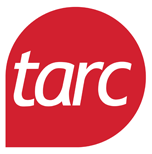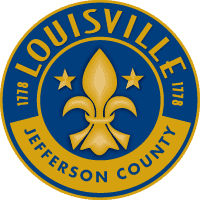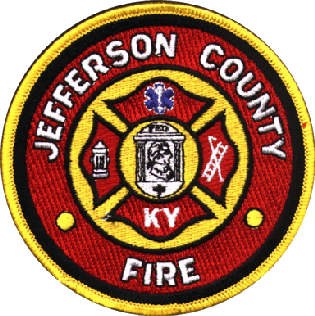
Louisville is the most populous city in the Commonwealth of Kentucky, sixth-most populous city in the Southeast, and the 27th-most-populous city in the United States. By land area, it is the country's 24th-largest city, although by population density, it is the 265th most dense city. Louisville is the historical county seat and, since 2003, the nominal seat of Jefferson County, on the Indiana border.

Jefferson County is located in the north central portion of the U.S. state of Kentucky. As of the 2020 census, the population was 782,969. It is the most populous county in the commonwealth.
In United States local government, a consolidated city-county is formed when one or more cities and their surrounding county merge into one unified jurisdiction. As such it is a type of unitary authority that has the governmental powers of both a municipal corporation and a county.

Jerry Edwin Abramson is an American Democratic politician who was the 55th lieutenant governor of Kentucky. On November 6, 2014, Governor Steve Beshear announced that Abramson would step down from his position as lieutenant governor to accept the job of Director of Intergovernmental Affairs in the Obama White House. He was replaced by former State Auditor Crit Luallen.

The Transit Authority of River City (TARC) is the major public transportation provider for Louisville, Kentucky and parts of southern Indiana, including the suburbs of Clark County and Floyd County. TARC is publicly funded and absorbed private mass-transit companies in Louisville, the largest of which was the Louisville Transit Company. In 2023, the system had a ridership of 6,655,200.
Harvey I. Sloane, a physician and Democrat, served two terms as Mayor of Louisville, Kentucky and also a term as county judge-executive of Jefferson County, Kentucky. He narrowly lost two Democratic primaries for Governor of Kentucky and lost a race for the United States Senate to incumbent Mitch McConnell.

The Louisville Free Public Library (LFPL) is the public library system in Louisville, Kentucky, and the largest public library system in the U.S. state of Kentucky.

The Louisville Metro Council is the city council of Louisville, Kentucky. It was formally established in January 2003 upon the merger of the former City of Louisville with Jefferson County and replaced the city's Board of Aldermen and the county's Fiscal Court. Louisville City Hall houses the offices and chambers of the council.

The Louisville Metro Police Department (LMPD) began operations on January 6, 2003, as part of the creation of the consolidated city-county government in Louisville, Kentucky, United States. It was formed by the merger of the Jefferson County Police Department and the Louisville Division of Police. The Louisville Metro Police Department has been headed by Jacquelyn Gwinn-Villaroel since January 2, 2023. LMPD divides Jefferson County into eight patrol divisions and operates a number of special investigative and support units. The LMPD is currently negotiating a consent decree with the United States Department of Justice (DOJ) subsequent to a 2023 investigation by the DOJ that concluded that the LMPD engaged in a decades long pattern of civil rights abuses.
The Jefferson County Judge/Executive is the nominal chief executive of Jefferson County, Kentucky. On January 3, 2003, the county government merged with that of its largest city, Louisville, to create the Louisville Metro Government. The former powers of the County Judge/Executive were assigned to the newly created office of Mayor of Louisville Metro.
As with most American cities, transportation in Louisville, Kentucky, is based primarily on automobiles. However, the city traces its foundation to the era where the river was the primary means of transportation, and railroads have been an important part of local industry for over a century. In more recent times Louisville has become a national hub for air cargo, creating over 20,000 local jobs. The city has also launched several initiatives to promote both utilitarian and recreational bicycling. In 2016 Walk Score ranked Louisville 43rd "most walkable" of 141 U.S. cities with a population greater than 200,000. In 2015, 11.7 percent of Louisville households were without a car, which decreased to 10.9 percent in 2016. The national average was 8.7 percent in 2016. Louisville averaged 1.61 cars per household in 2016, compared to a national average of 1.8 per household.

Louisville Metro Emergency Medical Services is the primary provider of pre-hospital life support and emergency care within Louisville-Jefferson County, Kentucky. LMEMS is a governmental department that averages 90,000 calls for service, both emergency and non-emergency, each year.

The Jefferson County Fire Service is an organization that coordinates the independent fire protection districts in Jefferson County, Kentucky. The JCFS was formed for the purpose of mutual aid, dispatch, training, and local standardization. The Shively Fire Department is the only suburban department that has not joined the JCFS; it uses the same dispatch and radio channels as the Louisville Division of Fire.

Gregory Edward Fischer is an American businessman and entrepreneur who served as the second mayor of Louisville Metro from 2011 to 2023. In 2019, he was elected vice president of the U.S. Conference of Mayors, and in 2020, he served as its president.

Lesbian, gay, bisexual, and transgender (LGBT) persons in the U.S. commonwealth of Kentucky still face some legal challenges not experienced by other people. Same-sex sexual activity is legal in Kentucky, although the state legislature has not repealed its sodomy statute for same-sex couples. Same-sex marriage is legal in Kentucky under the U.S. Supreme Court ruling in Obergefell v. Hodges. The decision, which struck down Kentucky's statutory and constitutional bans on same-sex marriages and all other same-sex marriage bans elsewhere in the country, was handed down on June 26, 2015.
The following is a timeline of the history of the city of Louisville, Kentucky, USA.

The Fairness Campaign is a Louisville, Kentucky-based lobbying and advocacy organization, focusing primarily on preventing discrimination on the basis of sexual orientation and gender identity. The Fairness Campaign is recognized by the IRS as a 501(c)(4) organization. The organization is a member of the Equality Federation.
One Touch Make Ready is the various statutes and local ordinances passed by various local governments and utilities in the United States, which require the owners of utility poles to allow a single construction crew to make changes to multiple utility wires.












